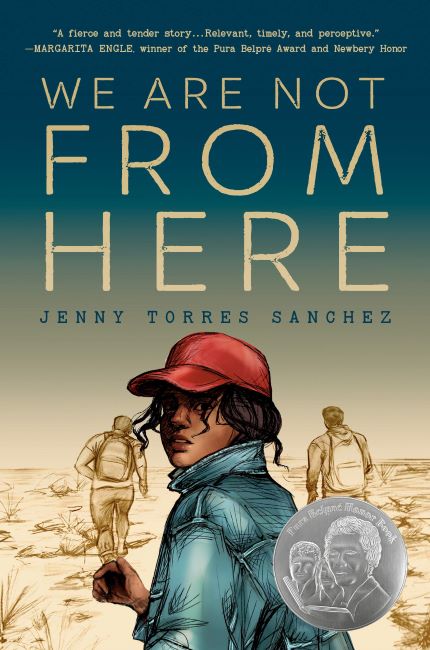Meet-the-Author Recording with Jenny Torres Sanchez
We Are Not from Here |
Jenny Torres Sanchez introduces and shares some of the backstory for creating We Are Not from Here.
Translate this transcript in the header View this transcript Dark mode on/off
Jenny Sanchez: Hi, my name is Jenny Torres Sanchez and I am the author of We Are Not From Here.
What inspired me for this book was mostly the news of unaccompanied minors arriving at the southern border. Just knowing that they were so young and they were making this journey by themselves was very heartbreaking for me. So I felt the need to write a book that really shed light on that.
The research was tricky because I can't and I didn't take a trip like this. They are riding on La Bestia which is a series of trains that runs through Mexico. Obviously I didn't make that trip. It's incredibly dangerous. So I relied a lot on some non-fiction work. There's a Salvadorian journalist named Oscar Martinez and his book, The Beast. Another book called The History of Violence were both really essential to me in writing this story. Oscar has actually taken this trip and he has ridden La Bestia to try to get as much of the truth of what the journey like this is like. I relied on his books and his knowledge a lot. Also the book, Tell Me How It Ends by Valeria Luiselli. She really takes the reader into what it's like to make this trip as a child, or to be a child who is migrating. Because she did the intake questionnaires for many children who were arriving at the southern border. Two wonderful books that really gave me a lot of insight about the trauma that migrant children suffer. Also a book called the Land of Open Graves by Jason De Leon and Open Veins of Latin America by Eduardo Galeano. All of those were really essential in giving me that information that really helped me make this story as accurate as possible.
My parents are from Central America. My mom's from Guatemala; my dad's from El Salvador, and I visited Guatemala several times growing up. I hung out with my cousins in Puerto Barrios where the book is set. I went to that little store on the corner of my Tia's house that in the book is Don Felicio's store. And I have a lot of family who still live there. So seeing the faces of Central American migrant children at the border and hearing their stories felt very personal to me. What is happening to migrants right now, the abuse and the inhumanity that they are suffering, it hurts and it angers me. And so it feels like it's being done to my family. It is very personal.
Writing the book was difficult and it seemed to me that as the journey became harder for my characters, the writing also became a lot harder for me. It was emotional and I felt this weight of great responsibility to get this story right in so many ways. It was important for me to get it right to honor and respect the story that is so many people's reality. So from the technical aspects of the journey, you know, the routes and the landscape and the conditions that they face, to the emotional aspect of what a trip like this would do to a child, was just incredibly important and essential to me. So the writing was intense. The process was intense, and I found myself hitting a wall a lot and wondering how I was going to finish it, but also knowing that I absolutely had to finish this book. So when I hit those hard times, I relied on Pulga, who is one of the characters in the book. I would search for beauty in the world and color in the world, which is something that he does a lot. I would turn to things to inspire me like art and music and poetry, and that really helped me get through some of those difficult times in writing this story.
I'd like to read the dedication today: This book is for Mariee Juarez, Jakelin Caal Maquin, Felipe Gómez Alonzo, Juan de León Gutiérrez, Wilmer Josué Ramirez Vásquez, Carlos Gregorio Hernández Vásquez, Darlyn Cristabel Cordova-Valle.
And all the children whose names we do not know, whose existence and demise have been hidden. And the children whose names will come after the publication of this book, who also suffered and died in United States custody while seeking refuge. For the children lost along the journey, the ones caught in between, guided only by their fragile hope, whose ghosts roam the borders and deserts of countries that failed them.
You deserved so much more. You deserved help. You deserved to dream. You deserved to live.
Y para toda mi gente; que luchan tanto, que son pura vida, esperanza, y belleza.
This Meet-the-Author Recording with Jenny Torres Sanchez was exclusively created in December 2020 by TeachingBooks with thanks to Penguin Publishing Group USA.



